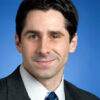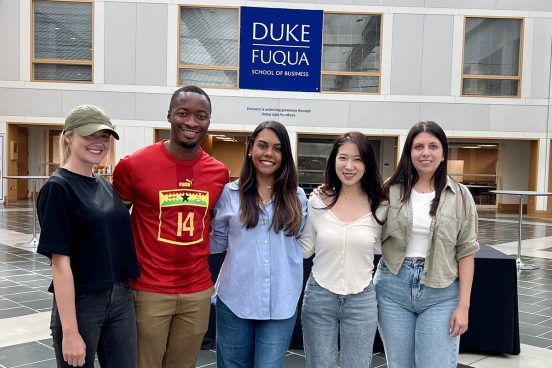Duke Daytime MBA Student Blog

Learning to Fly
Boeing CEO Speaks at Fuqua
Fuqua beams with pride at the characterization of its students as ‘high flying,’ but this description took on a literal meaning when Boeing CEO Jim McNerney arrived on campus to theorize on leadership and innovation in an increasingly complex global marketplace. Speaking with the credibility of many years of experience in the aerospace industry, he extolled Fuqua for the level of leadership and energy provided by its graduates, before giving an enthralling ‘state of the industry’ address.
![]() View video of Jim McNerney’s talk.
View video of Jim McNerney’s talk.
With an audience seemingly salivating for clues to the newest technology in aerospace, Mr. McNerney did not disappoint. He provided descriptions of groundbreaking new jet models that will transform the way we perceive international travel and boasted of his company’s recent achievements in defense aircraft design; indeed, the timing of this talk could not have been better, with Boeing having signed a massive contract with the United States Air Force in the past week. He intimated that Boeing has maintained its advantage, and been the only aerospace firm to approach its 100th birthday, by using a strategy that involves coupling new technologies with innovations and improvements to existing ones. A reinvigorated economy, he suggested, has supplied renewed confidence to this highly respected behemoth.
However, the enduring takeaway of his speech came not from a “commercial” about his company, but from the manner in which he related his company’s success to values eerily comparable to those embraced by Fuqua. As he described his Boeing’s century of profitability at the intersection of innovation, leadership, and global competitiveness, I couldn’t help but feel a sense of déjà vu, of indeterminate origin. At some point, it dawned on me that after six months here, the words he spoke were so engrained in me, through coursework and through the concept of Team Fuqua, that I hardly blinked at what should have been some kind of novel conceit. Mr. McNerney didn’t attend Fuqua, nor did Fuqua co-opt his worldview at some point, but this inescapable correlation demonstrated that Fuqua truly has its collective finger on the pulse of the business community.
As the speech progressed into a spirited Q&A session, I could sense that I wasn’t the only one who detected the similarities. Before the speech, I’d have predicted that the interactive phase would have consisted of a series of technical engineering terms unknown to me, but this was no ordinary CEO, nor was it any typical student body. Jargon-filled discourse about 747s was replaced by a more philosophical examination of the role an aerospace giant can play in providing security to an increasingly fragile world. The balance sheet was eschewed in favor of a balanced environment, as Mr. McNerney professed the merits of investing in alternative fuel sources and solar technology. The receptiveness of this crowd allowed Mr. McNerney to demonstrate the humanity of an industry that has long been maligned and mischaracterized.
In keeping with Fuqua’s long standing convention of disregarding convention, we poured out of Geneen on that Tuesday afternoon to Fuqua Friday. However, in the Fox Center, a scene involving scores of diverse students working together to dissect a unique take on poker provided a physical manifestation of the words just spoken, albeit with somewhat more beer and better food. It was a scene that Mr. McNerney would have appreciated had he seen it, but for us, it was just another ‘Friday.’



